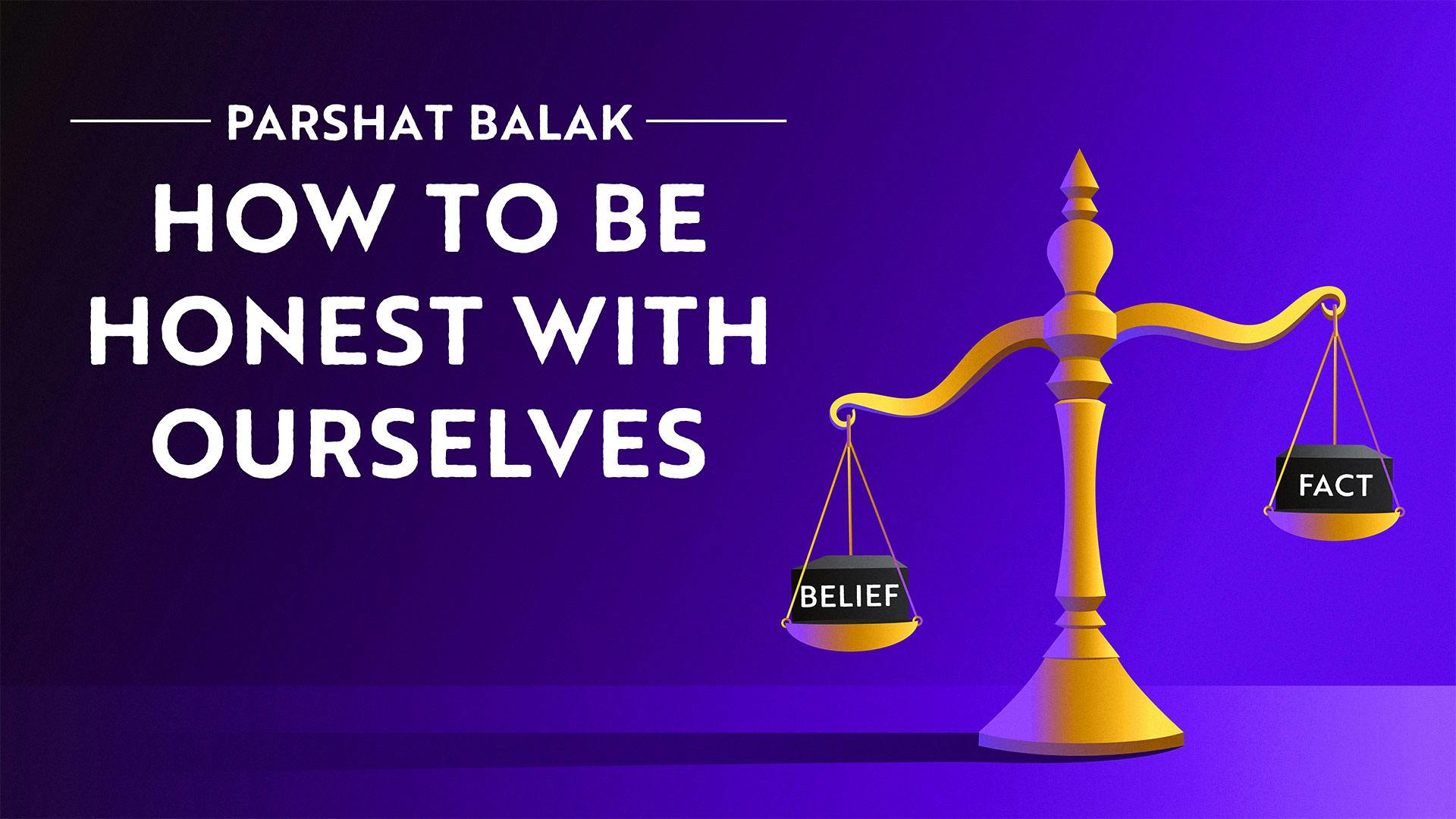
D’var Torah Parshat Balak
Bilaam: How Can He Be both a Prophet of God and Super Wicked?
BY Evan Weiner | July 15, 2024 | 6 Minute Read
D’var Torah on this Week’s Torah Portion
Would God Choose Someone Wicked to be a Prophet?
I don’t know about you, but I always imagined that you had to be a pretty decent guy in order to be a prophet. Having God talk directly to you sounds like the kind of thing reserved for big tzadikim (righteous people), definitely not for a guy like Bilaam (Balaam), who's nicknamed “HaRasha” (the wicked). If God is willing to talk to people with a reputation for evil like Bilaam, then decent folks like you and me should be getting prophetic messages from God all the time, but we don’t.
What kind of Prophet was Bilaam?
Bilaam was the prophet who was highly regarded in his time for the effectiveness of his prophetic blessings and curses (Numbers 22:6), yet to us, he is well known as “Bilaam HaRasha” (בִּלְעָם הָרָשָׁע). Chazal, the Sages of the Mishnah and Talmud, paint a really nasty picture of Bilaam’s character. Just one mild example is in Pirke Avot (5:19), the Sages describe Bilaam as greedy, haughty, and selfish. It just seems so weird that Chazal portray Bilaam as a huge Rasha, and yet, he was still a prophet of God.
Does the Torah Actually Describe Balaam As Wicked?
Another strange thing about Bilaam’s reputation for evil is that when you read the story, a different picture of Bilaam emerges. He keeps saying, “I can only say what God puts in my mouth” (Numbers 22:38), “I can’t transgress anything God says” (Numbers 22:18), and he actually follows through on that. There’s a genuine sense of humility in what he says. Granted, he was willing to curse the Israelites, but he’s just helping save Balak from an existential threat. At the very least, he definitely doesn’t come across as the paradigm of haughtiness like we hear about in Pirke Avot. I don’t think Chazal were just making things up, but what did they see in the Torah that convinced them that Bilaam was so supremely evil?
Exploring a Strange Counterpart
To get a better understanding of why Chazal see Bilaam as such a rasha, we need to explore a strange contrast they make between Bilaam and someone you would least expect: Avraham Avinu (Abraham our father). The two lived centuries apart, their roles in the drama of the Torah are of completely different proportions, and their respective impact on humanity doesn’t even warrant mentioning the two of them in the same breath. Yet, Chazal (in Pirke Avot 5:19) still contrast them. Why?
Chazal are masters at closely reading the Torah, and I believe they actually pick up on some clues connecting the Bilaam story with an important event in Avraham’s life. When you read the Bilaam story, you’ll see him wake up in the morning, saddle his own donkey, set out on a journey accompanied by two young lads, build altars, and get stopped by an angel of God before he completes his mission (see Numbers 22:21-26). Does that sound like anything from Avraham’s life? It sure sounds a lot like the Akeidah, the binding of Isaac, to me (See Genesis 22:3-12). All of these things happen in the Akeidah, almost in the exact same order!
With all these parallels, it seems like the Torah sets up Bilaam’s journey to curse the Israelites as his own “Akeidah-like test.” But what does that even mean? The real Akeidah and Balaam’s “Akeidah” couldn’t seem further apart. Avraham has to sacrifice his beloved son. He is going to lose something so dear and precious to him. But Balaam…he doesn’t need to give up anyone or anything. In fact, he actually stands to gain a lot from his journey to curse the Israelites. Furthermore, when we read the story of Balaam, it’s about how he navigates a straightforward business proposition: he checks with God, gets an answer, and then tries to carry out his end of the deal. He doesn’t have to grapple with the potential loss of a child or the same confounding moral questions confronting Avraham in the Akeidah. So, what is the Torah trying to tell us by creating these parallels? And how does connecting these two journeys help us understand why the Sages attribute such wickedness to Balaam?
In this video Rabbi Fohrman and the Aleph Beta team dive deep into this comparison and emerge with a whole new perspective on Bilaam that has powerful implications for how we engage in doing mitzvot. Subscribe now to add meaning to your Shabbat table and inspire your company with the beauty of the Torah.
Parshat Balak in a Nutshell
In this week’s Torah portion, Parshat Balak, the King of Moab, is afraid the approaching Israelites will conquer his land. He decides to send for Bilaam, a prophet, to wage a spiritual attack on the Israelites. After initially saying, “No,” God grants Bilaam permission to go with Balak’s messengers. Along the way, we have the famous story of Bilaam and the donkey. Bilaam’s donkey sees a vision of an angel, but Bilaam, oblivious to the angel’s presence, keeps hitting his donkey. Miraculously, Bilaam’s donkey begins to speak. When Bilaam eventually reaches Moab, he attempts to curse the Israelites three times, but each time pronounces blessings instead.
Commonly Asked Questions about Balak
Who was Bilaam?
Bilaam was a prophet renowned for the effectiveness of his blessings and curses. Balak, the king of Moab, tried to employ his prophetic services in an attempt to defeat the Israelites, whom he viewed as an oncoming threat.
How did Bilaam die?
After Bilaam’s efforts to curse the Israelites failed, Balak, king of the Moabites who had hired Bilaam as a spiritual weapon against the Israelites, sent him away from Moab. In Numbers 31:8, the Torah describes how Bilaam was killed by the sword.
What is the correct pronunciation of Bilaam?
Most English translations write the prophet’s name as “Balaam.” The first syllable contains an “aw” sound, and the second syllable is a short “o” sound. However, the Hebrew pronunciation is “Bilaam,” with the first syllable containing a short “i” sound instead.
Are Baal and Bilaam the same?
Baal was a common Canaanite idol. The name derives from the Hebrew word “בעל,” meaning master. Bilaam, the name of the prophet whose donkey spoke to him, comes from a different root word (see question on the meaning of Bilaam).
What is the meaning of Bilaam?
Rabbi Fohrman has suggested that his name can be broken down into בל עם, meaning “without nation.” When you think about the way Bilaam serves as a spiritual mercenary, it feels like a fitting name. A mercenary is someone who has no stake in any side in a conflict. He is not devoted to one particular nation or group; instead, for the right amount of money, he’s willing to harm whomever his benefactor wants, because he is “without a nation.”
More Balak Videos

The Hidden Lesson Behind The Story Of Balak
Video • 11 min
For the first time in a while, the main characters of this parsha are not the people of Israel. While the story of Bilak and Bilaam is interesting, we wonder: the Torah isn’t an all-inclusive history book; why does the Torah tell us this story?

A Lesson Of Fact And Fiction From King Balak Of Moab
Video • 15 min
Are we rational? Do we use evidence and data to make decisions? See how Parshat Balak addresses that question, head-on.
Balak Pages
What is Aleph Beta?
Aleph Beta is a unique kind of Torah library. Led by our founder, Rabbi David Fohrman, we are dedicated to high-level, textual Torah learning for adults that is intellectually and spiritually sophisticated, that enlivens your Jewish practice and helps you forge a deeper connection to God. Whether you’ve been learning in yeshiva for years or you’re just beginning your Torah journey, you’re sure to find something meaningful and surprising waiting for you here.
Browse our library of over 1,000 beautifully produced animated videos, podcasts, deep dive courses, and printable guides. Topics include the weekly parsha, Jewish holidays & fast days, laws & mitzvot, prayers, relationships, big philosophical ideas and more. Have something to say at the Shabbos table that will amaze your family and guests and bring deep meaning into their lives.


